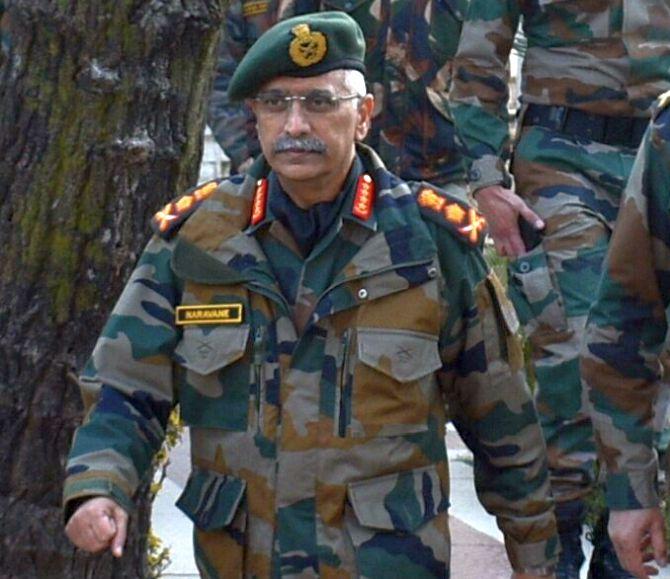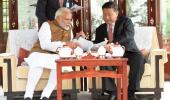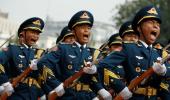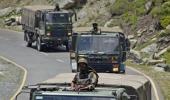'India will keep trying to avoid conflict.'
'This is the moment when we draw a line in the sand.'

"I hope the government wakes up, understands that the way they have been handling security and strategic affairs. They don't have the luxury of time," strategic affairs expert Sushant Sareen -- Senior Research Fellow at the Observer Research Foundation and author of Corridor Calculus: China-Pakistan Economic Corridor & China's comprador model of investment in Pakistan -- tells Rediff.com's Prasanna D Zore in the concluding segment of a two-part interview.
The Chennai summit at Mahabalipuram -- that was part of the famed Wuhan Spirit -- between the two powerful leaders of the top two populous countries in the world did end on a happy note. What soured after that?
The Wuhan spirit is a ghost (after what happened at Galwan).
I don't know what soured, but where was the Wuhan Spirit when it came to issues of great importance to India?
The Chinese position on Kashmir, for example, taking it to the UNSC (United Nations security council) happened post Wuhan.
The Chinese fingering us on Masood Azhar was post Wuhan.
The Chinese obstructing us on a number of other issues was post Wuhan.
What were we getting out of Wuhan anyways? I am not against such informal summits, but there has to be some deliverables at the end of it.
What tangible goals did the two informal summits achieve for India? Some, critics would say, other than the martyrdom of 20 Indian soldiers.
So very clearly, after the martyrdom of 20 Indian soldiers, if at all, there was something which somebody was trying to extract from these summits, that is dead and gone.
I have nothing against leaders meeting at an informal level trying to develop a better understanding of their positions, etc.
I can also understand nothing tangible coming out of it.
But, at the very minimum, one thing must happen: A better understanding between the two countries (of their respective positions on contentious issues); that there is a greater effort to try and move into a much more cooperative and less confrontationist direction.
But if none of that has happened, then I think that entire policy framework under which we were dealing with the Chinese will now need to be thrown out of the window.
Do you think the Galwan Valley massacre of 20 Indian soldiers has snowballed into a huge diplomatic blunder for Prime Minister Modi's informal summitry? Would you agree?
I wouldn't say a blunder because I don't know how something treacherous that the Chinese have done is a diplomatic blunder of Modi.
If at all it is a blunder, then that blunder has been made by China.
Because Modi trusted Xi Jinping so much and now the Chinese gave India the Galwan Valley martyrdom of Indian soldiers?
I don't think Mr Modi's is anybody's fool. Nobody trusts anybody, especially in politics.
This is most certainly not diplomatic blunder. I think what you can say is that Mr Modi certainly tried to change the way India-China relation was structured. He made a very bold gamble to try and improve relations with the Chinese, just as he tried it with the Pakistanis.
Now somebody can find fault with whether he should have gone that far or taken that path. That's a matter of debate.
What you cannot deny him is that he made a very strong effort to try and improve relations with China.
What Galwan has done is, it has poured water over all those efforts.
But to say that Galwan is a diplomatic blunder would be unfair (to Modi).
But what Galwan has done is, it has probably thrown the most significant strategic, economic and security challenge, which will now confront the Modi government.
In 2018 we had Indian and Chinese troops standing eyeball-to-eyeball in Doklam for 73 days fighting in Bhutan. Yet the two leaders put it behind them and came up with the Wuhan Spirit.
Then the two leaders met again at Mahabalipuram under the shadow of abrogation of Article 370 in the then state of Jammu & Kashmir.
Would the two leaders dare to meet again, formally or otherwise, now that India has lost 20 soldiers to Chinese misadventures?
Would Modi still bet on another informal summit as and when the situation improves along the LAC?
Over the last six years the one big thing over which I have always burned my fingers is trying to predict what Mr Modi is going to do next. Frankly, I have no idea.
Whether there will be an informal summit somewhere and whether he will go in for it or not, I am very clear on one thing.
He is not afraid of taking risks when it comes to foreign policy. But in my personal view we need to understand that signalling is extremely important in international relations.
For India to now engage with the Chinese in the same way as we were doing in the past, whether it's the informal summits, whether it is any other kind of diplomatic engagements, will convey a very, very, negative message to the Chinese in the sense that they will think Indian leaders talk big, but they don't have what it takes to stand up against us.
To reiterate what I have been saying, the entire framework of policy towards China needs to go back to the drawing board.
And if you don't do it, then whatever you do, is likely to be misconstrued by the Chinese.
Modi has invested so much political capital in building an informal diplomacy template for solving bilateral issues between the two most populous countries in the world. Perhaps he wanted to leave an imprint on how diplomacy should keep pace in modern times.
Has the India-China standoff in Galwan valley put paid to Modi's informal brand of diplomacy?
Like I said, I don't know whether it has, but I think it should. It has also demonstrated the limits of personal diplomacy or personality-based diplomacy.
Now, there is certainly something to be said for adding a personalised form of diplomacy to the larger structural diplomatic relations that you have with any other country, especially a country which is ruled by a political strongman or an authoritarian leader or a dictator or whatever.
If you can bring a level of personal affinity into the larger structural relationship between countries, it can help you remove a lot of irritants, even make breakthroughs which otherwise would be caught up in the structural, bureaucratic obstacles.
Very clearly, this personalised diplomacy hasn't worked in China's case.
Because after all, at the risk of repeating myself, whether it is on our sensitivities on CPEC (China-Pakistan Economic Corridor), sensitivities on delineating the LAC; they've been stuck up on that; whether it's on the NSG (Nuclear Suppliers Group), whether it's on Masood Azhar, eventually they gave in, but the circumstances under which they gave in was vastly different or dragging us to the UNSC on Kashmir.
You name the issue. To my mind, there's enough of a red line which had been breached, after which, we should have really downgraded our level of engagement with the Chinese to show them angry we are.
Very clearly, the addition of personalised diplomacy hadn't made any significant dent on the structural diplomacy between India and China.
So, what is the purpose being served by the personalised diplomacy?
Would you think that the Galwan Valley martyrdom of 20 Indian bravehearts is this Modi's Nehru moment of 1962?
That is really a big exaggeration.
India-China relations has always been troublesome and there is no point downplaying it or brushing it under the carpet and there's no point pretending that these things happen.
Sorry, but these things (the martyrdom of 20 Indian soldiers) don't happen.
This surely is not a 1962 moment; far from it. But this is, like I said, probably the most significant security and strategic challenge which now confronts the Modi government.
What path the Modi government now takes will be critical in determining the future course of relations between India and China and also the future course of Indian diplomacy: The larger strategic context in which India is going to be operating, what are the kind of relationships India will need to forge with other countries that are spooked by the Chinese expansionism.
I think all those things are now going to come to a head. We have been waffling on many of these issues.
If you do not break out from diplomatic template that has guided India's China policy then I am afraid we'll continue to work on the same old wages.
The Chinese will keep pushing India; India will keep trying to avoid conflict.
The LAC will remain unsettled; the interpretation and the reinterpretation, and perception and the misperception of the LAC will keep changing.
This is the moment when we draw a line in the sand.
What's your assessment of the Galwan standoff and what's the road ahead for India?
We need to be very clear that what has happened in Galwan was not a localised issue; it is part of a larger strategic posturing which the Chinese have been doing.
Secondly, the effort seems to be that this immediate crisis which is staring us in the face, there are efforts being made to defuse it by both sides and it's possible that it gets diffused without any further escalation.
I don't think any side wants an escalation at this point in time. But just as what happened in the late 1950s, events of the late 1950s leading up to 1962, I think we are at that moment now.
So, almost 60 years later, we are back to that moment, which led up to 1962.
And I would really hope that the government wakes up, smells the coffee, understands that the way they have been handling security and strategic affairs.
There's really need to relook at it and they don't have the luxury of time.
Whatever modernisation programmes, whatever firepower, whatever other wherewithal, whatever manufacturing capabilities (India must build), you need to move like we did it yesterday.
And that is my one fear that once the immediate crisis is over we have a tendency of going back to business as usual.
Finally, we really need to start looking at our strategic alignments.
This nonsense about strategic autonomy, which is meaningless, and which nobody understands what it actually means, I think needs to be junked and we really need to start rethinking the kind of strategic alignments we have to get into and whatever price has to be paid for that we need to be ready to pay it.
Unless, of course, you want to work on the same wages, which means that the Chinese keep pushing us.
This is a moment of truth. We need to decide upon the direction our foreign policy has to take.
If we don't, then I'm afraid there will be another Galwan.
Production: Aslam Hunani/Rediff.com











 © 2025
© 2025